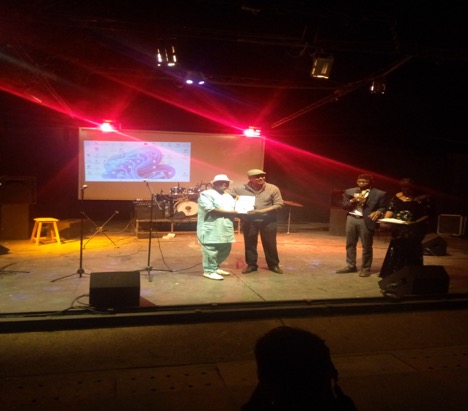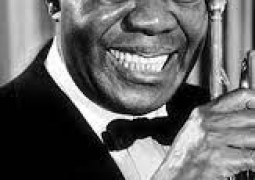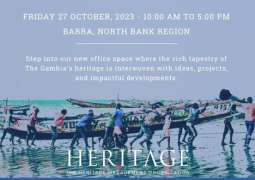
The celebration of the International Jazz Day held at the Alliance Francaise pavilion along Kairaba Avenue on 29th April was also used to award dozens of Gambians and non-Gambians for their support and contributions to the development of music in the country, while a minute silence was observed for the demised of all the Gambia music legends who had contributed in one way or another to the development of music in the country.
In his opening remarks, Lamin Jarjou, the Program Officer of the UNESCO-Natcom office in The Gambia said the day was celebrated in advance in The Gambia while noting that every 30th of April is set aside for the celebration of the International Jazz Day since 2011.
He described the commemoration of last year's edition of the International Jazz Day as a memorable one to the UNESCO-Natcom, thus “this year too will be a remarkable one.”
Madam Maimuna Sidibeh, acting Secretary General for UNESCO NATCOM in The Gambia thanked the participants which include the American Ambassador to The Gambia, French Charge De Affair in The Gambia, UNESCO-NATCOM vice chairperson, and among other guests for honoring their invitation.
She, therefore, welcomed everyone to the event saying in the previous edition they were able to interact with musicians and Jazz lovers “and with support from our partners and stakeholders we could be doing it annually while we are looking forward to participating in the next year Jazz Festival in St Louis, Senegal.”
On the next year's Jazz Festival in St Louis, she said the UNESCO-NATCOM is looking forward to the participation of all “our stakeholders to join hand with us so that the Gambians can also showcase their abilities at the International Jazz Festival,” she expressed.
However, Madam Sidibeh shared a message from the Director General of UNESCO in Paris, Madam Audrey Azoulay to everyone at the gathering.
An excerpt from the message as read by the acting Secretary General disclosed that “One century ago, in April 1923, Joe “King” Oliver and his Creole Jazz Band released an influential record, whose use of trumpets and cornets would shape the future of jazz. It featured for the first time Louis Armstrong, one of King Oliver’s many students – for the legendary musician was also a teacher.”
“This record, she continued, “reflects what International Jazz Day is all about – transmission. And transmission, of the art and spirit of jazz, is the focus of this year’s celebrations. For this reason, in partnership with the Herbie Hancock Institute of Jazz, we are once again bringing together people around the globe to mark this International Day, with hundreds of events and concerts in over 150 countries, as well as many master classes and lectures. We will also celebrate the values
of jazz: artistic freedom, musical exploration, and dialogue between instruments, people, and cultures.”
However, Dr. Jaliba Kuyateh, late Tatadindin Jobarteh, late Musa Ngum, Bai Janha (AKA) Gambia’s Jimmy Hendrix, Abdel Kabir Ngum (AKA) Lie Ngum, Badou Jobe, Sambou Susso, Paps Touray singer of the Ifabondi Band, Senemi Taylor of Senegal, Oussou Lion Njie, Ossou Njie Senor, and Oko Drammeh - a music promoter, and late Malang Gassama – percussionists were all received awards for their notable contribution to Gambian music.
Mr Mhatarr Njai, a writer and columnist that runs a popular Jazz Entertainment with different newspapers including the defunct Daily Observer newspaper, The Point newspaper gave a comprehensive brief history of jazz in The Gambia.
Sharing his experience in jazz mesmerized the minds of the audience while saying that to most Gambians jazz is like a new word to them but noting that all the music that “we are dancing are under the umbrella of jazz.”
However, he used the opportunity also to pay tribute to the past jazz maestro in the Gambia and other music doyens.





